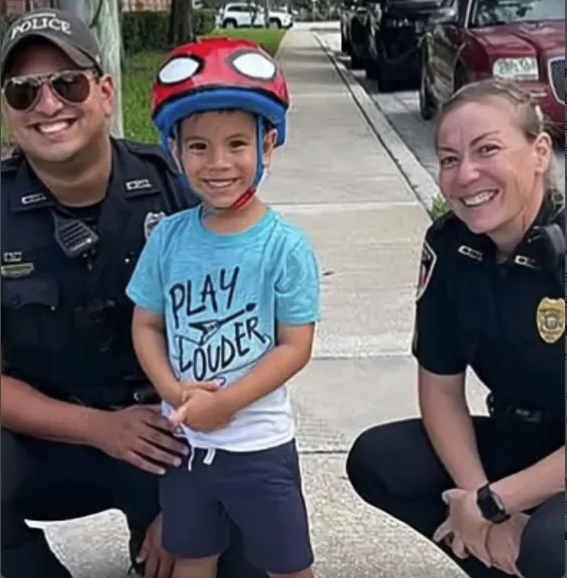
Twenty-one years ago, Officer Strobl put a helmet on a little boy so he could ride his bicycle safely. It was a small gesture—the kind police officers make dozens of times in their careers. A kid without proper safety equipment, an officer who took a moment to make sure he was protected. Nothing extraordinary. Just good police work.
The boy grew up. Became a Kissimmee Police Officer himself. And a few months ago, he brought his own son to the station for a helmet.
Who put it on? The same person—now Sergeant Strobl.
Two generations. One act of care repeated across decades. Strobl remembered that boy from twenty-one years ago and knew he’d see him in uniform someday. The young officer held up the helmet and said words that explain everything: “This man is reason I’m here.”
The photo shows them together—Sergeant Strobl and the young officer, with the child between them wearing his new helmet, all three smiling. The boy in the middle represents the future. The young officer represents the past coming full circle. And Sergeant Strobl represents the quiet consistency of showing up and caring, year after year.
This is what we mean when we talk about police making a difference in communities. Not through dramatic interventions or viral moments, but through small acts of care repeated so consistently that they shape entire lives.
A helmet on a child’s head. A moment of attention from an officer who cared. That’s all it took to plant a seed that would grow for twenty-one years, eventually producing another officer who wanted to serve his community the same way.
“Knew I’d see him in uniform,” Strobl said. Because when you care for children properly, when you show them that service matters and that adults in uniform can be trusted and kind, some of them grow up wanting to embody those same values.
The young officer didn’t become a cop because of one helmet. He became a cop because of what that helmet represented—an adult who cared enough to stop, to help, to make sure a kid he didn’t know was safe. That moment taught him something about what it means to serve others.
Now he’s doing the same. Bringing his son to the station, getting him a helmet, creating another moment of care that might shape another life decades from now. The cycle continues because Officer Strobl started it twenty-one years ago.
“Sometimes one helmet on child’s head shapes destiny for decades ahead.”
It’s a beautiful truth that challenges our assumptions about how change happens. We think transformation requires grand gestures, big programs, systemic interventions. Sometimes it does. But sometimes it just requires an officer taking a moment to put a helmet on a kid’s head and making sure he’s safe.
That kid grows up remembering. Remembering that police officers helped him. Remembering that adults in authority can be kind. Remembering that service to community looks like making sure children are protected.
And then he becomes what he remembered. Joins the force. Serves his community. Brings his own son for a helmet from the same man who helped him.
Sergeant Strobl has probably put helmets on hundreds of kids over his career. Most of them he’ll never see again. But this one came back—not just to thank him, but to join him. To become a colleague. To continue the work of caring for the next generation.
The little boy in the middle of that photo doesn’t know yet how significant this moment is. He just knows he got a cool helmet from police officers who smiled at him and made him feel important. He doesn’t know that his father is standing there because of a similar moment twenty-one years ago.
But someday he will. Someday he’ll understand that the reason his dad became a police officer traces back to a sergeant who took time to care. And maybe—just maybe—he’ll grow up wanting to do the same.
That’s how legacies are built. Not through monuments or proclamations, but through small acts of kindness repeated across generations. Through officers who take time to care. Through children who remember and grow up wanting to embody what they experienced.
Twenty-one years ago, Officer Strobl put a helmet on a little boy. Today, Sergeant Strobl put a helmet on that boy’s son. And somewhere in that circle is the most beautiful kind of service—the kind that echoes across decades.